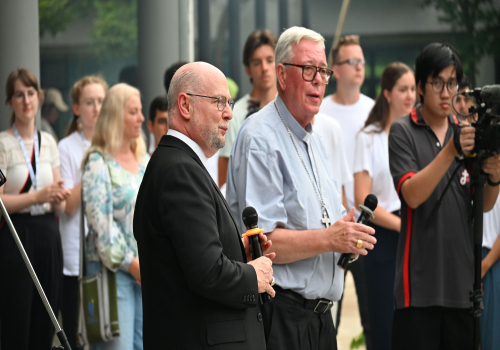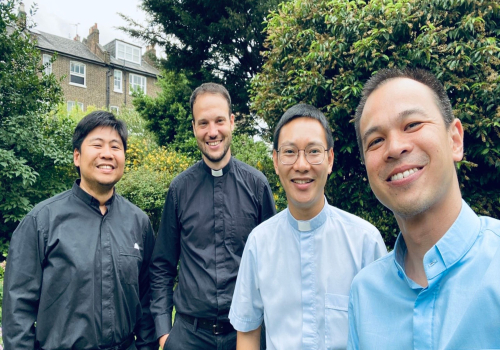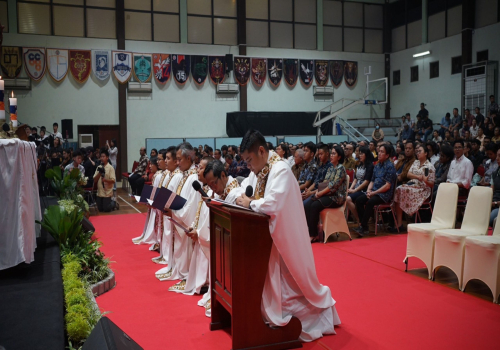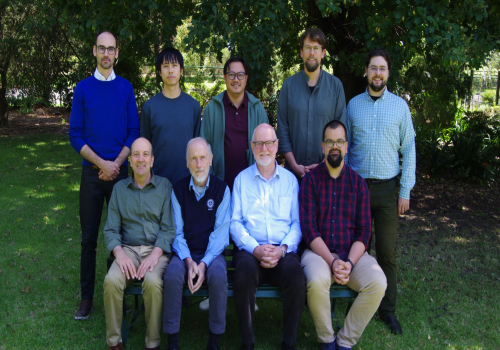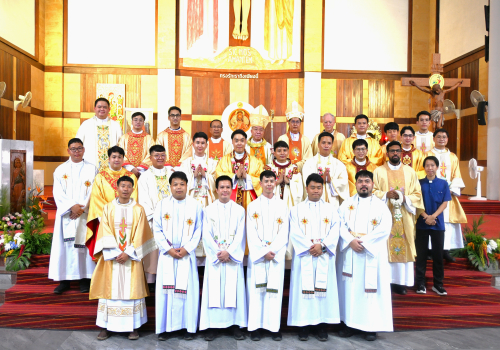
CHARACTERISTICS OF OUR WAY OF PROCEEDING
…..these characteristics we need especially to draw upon today…..
1. Deep Personal Love for Jesus Christ
In remorse, gratitude, and astonishment — but above all with passionate love — first Ignatius, and then every Jesuit after him, has turned prayerfully to "Christ our Lord hanging on the Cross before me," and has asked of himself, "What have I done. for Christ? What am I doing for Christ? What must I do for Christ?" [quotations from the Spiritual Exercises of St. Ignatius] The questions well up from a heart moved with profound gratitude and love. This is the foundational grace that binds Jesuits to Jesus and to one another. "What is it to be a Jesuit today? It is to know that one is a sinner yet called to be a companion of Jesus as Ignatius was." [quotation from General Congregation 32]
2. Contemplative in Action
To discover and join the Lord, laboring to bring everything to its fullness, is central to the Jesuit way of proceeding. It is the Ignatian method of prayerful discernment, which can be described as "a constant interplay between experience, reflection, decision and action, in line with the Jesuit ideal of being 'contemplative in action.' " [quotation from General Congregation 32]
3. An Apostolic Body in the Church
Jesuits today join together because each of us has heard the call of Christ the King. From this union with Christ flows, of necessity, a love for one another. We are not merely fellow workers; we are friends in the Lord. The community to which we belong is the entire body of the Society itself, however dispersed over the face of the earth. Coming from many nations and cultures, speaking many languages, our union is enriched, not threatened, by diversity. And in our service of the Lord, and his spouse, the Church, the People of God, we are especially united to the Roman Pontiff in order to be sent on the missions he may entrust to us.
4. In Solidarity with those most in need
Ignatius and his followers began their preaching in poverty. They worked with the powerful and the powerless, with princes, kings, and bishops, but also with the women of the street and with the victims of the plague. They linked their ministry to the powerful with the needs of the powerless. Today, whatever our ministry, we Jesuits enter into solidarity with the poor, the marginalized and the voiceless, in order to enable their participation in the processes that shape the society in which we all live and work.
5. Partnership with Others
Partnership and cooperation with others in ministry is … an essential dimension of the contemporary Jesuit way of proceeding, rooted in the realization that to prepare our complex and divided world for the coming of the Kingdom requires a plurality of gifts, perspectives and experiences, both international and multi-cultural. Jesuits, therefore, cooperate with lay women and men in the Church, with religious, priests, and bishops of the local Church in which they serve, with members of other religions, and with all men and women of good will.
6. Called to Learned Ministry
Ignatius very quickly saw the need for learning in the service of the faith and the ministry of the Word. Therefore it is characteristic of a Jesuit that he embody in creative tension this Ignatian requirement to use all human means, science, art, learning, natural virtue, with a total reliance on divine grace. In the context of the complex challenges and opportunities of our contemporary world, this ministry requires all the learning and intelligence, imagination and ingenuity, solid studies and rigorous analysis that we can muster.
7. Men Sent, Always Available for new Missions
Nadal, in promulgating the Constitutions, asked: 'Why are there Jesuits? There are diocesan priests and bishops.' He answers simply that our charism, indeed our reason for existence, is that we might go where needs are not being met. Our way of proceeding encourages this mobility. A Jesuit is essentially a man on a mission, a mission he receives from the Holy Father and from his own religious superior, but ultimately from Jesus Christ himself, the one sent by the Father. Jesuits remain "ready at any hour to go to some or other parts of the world where they may be sent by the sovereign pontiff or their own superiors." [quotation from the Constitutions of the Society of Jesus]
8. Ever Searching for the Magis
The magis ["greater"]is not simply one among others in a list of Jesuit characteristics. It permeates them all. The entire life of Ignatius was a pilgrim search for the magis, the ever greater glory of God, the ever fuller service of our neighbor, the more universal good, the more effective apostolic means. "Mediocrity has no place in Ignatius' world view." [Fr. Peter-Hans Kolvenbach]
Conclusion
Our way of proceeding is a way of challenge. But "this way of proceeding is the reason why every son of the Society will always act and react in a consistently Jesuit and Ignatian way, even in the most unforeseen circumstances." [Fr. Pedro Arrupe]





